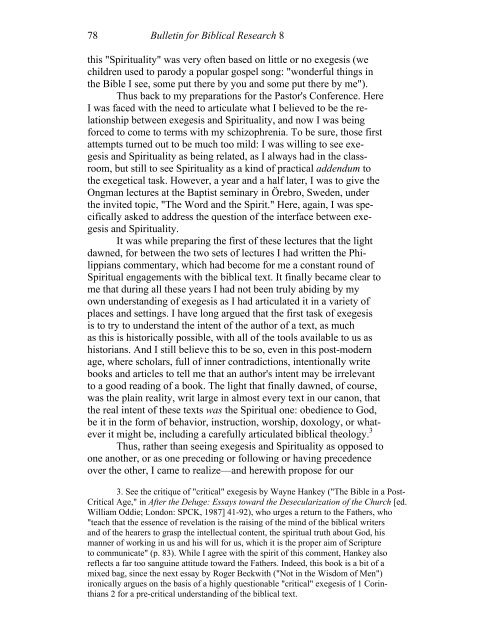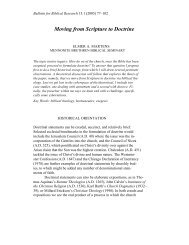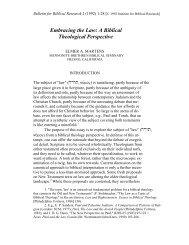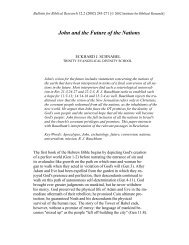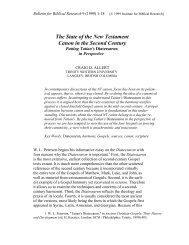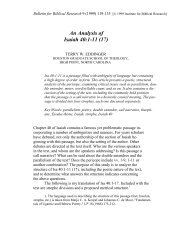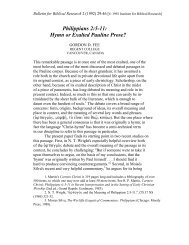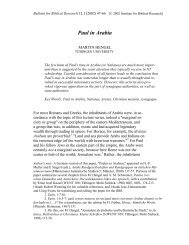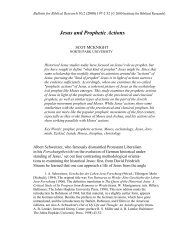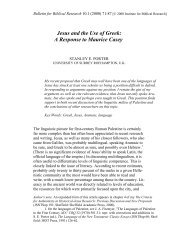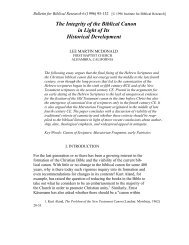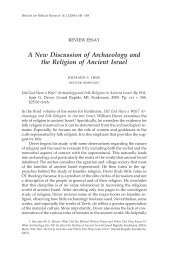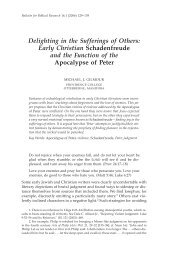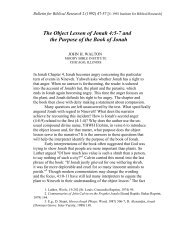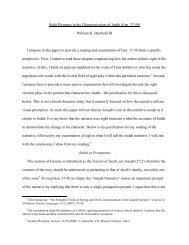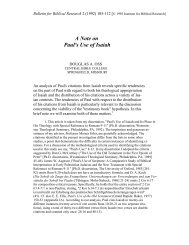Reflections on Exegesis and Spirituality in Philippians 4:10-20
Reflections on Exegesis and Spirituality in Philippians 4:10-20
Reflections on Exegesis and Spirituality in Philippians 4:10-20
Create successful ePaper yourself
Turn your PDF publications into a flip-book with our unique Google optimized e-Paper software.
78 Bullet<strong>in</strong> for Biblical Research 8<br />
this "<strong>Spirituality</strong>" was very often based <strong>on</strong> little or no exegesis (we<br />
children used to parody a popular gospel s<strong>on</strong>g: "w<strong>on</strong>derful th<strong>in</strong>gs <strong>in</strong><br />
the Bible I see, some put there by you <strong>and</strong> some put there by me").<br />
Thus back to my preparati<strong>on</strong>s for the Pastor's C<strong>on</strong>ference. Here<br />
I was faced with the need to articulate what I believed to be the relati<strong>on</strong>ship<br />
between exegesis <strong>and</strong> <strong>Spirituality</strong>, <strong>and</strong> now I was be<strong>in</strong>g<br />
forced to come to terms with my schizophrenia. To be sure, those first<br />
attempts turned out to be much too mild: I was will<strong>in</strong>g to see exegesis<br />
<strong>and</strong> <strong>Spirituality</strong> as be<strong>in</strong>g related, as I always had <strong>in</strong> the classroom,<br />
but still to see <strong>Spirituality</strong> as a k<strong>in</strong>d of practical addendum to<br />
the exegetical task. However, a year <strong>and</strong> a half later, I was to give the<br />
Ongman lectures at the Baptist sem<strong>in</strong>ary <strong>in</strong> Örebro, Sweden, under<br />
the <strong>in</strong>vited topic, "The Word <strong>and</strong> the Spirit." Here, aga<strong>in</strong>, I was specifically<br />
asked to address the questi<strong>on</strong> of the <strong>in</strong>terface between exegesis<br />
<strong>and</strong> <strong>Spirituality</strong>.<br />
It was while prepar<strong>in</strong>g the first of these lectures that the light<br />
dawned, for between the two sets of lectures I had written the <strong>Philippians</strong><br />
commentary, which had become for me a c<strong>on</strong>stant round of<br />
Spiritual engagements with the biblical text. It f<strong>in</strong>ally became clear to<br />
me that dur<strong>in</strong>g all these years I had not been truly abid<strong>in</strong>g by my<br />
own underst<strong>and</strong><strong>in</strong>g of exegesis as I had articulated it <strong>in</strong> a variety of<br />
places <strong>and</strong> sett<strong>in</strong>gs. I have l<strong>on</strong>g argued that the first task of exegesis<br />
is to try to underst<strong>and</strong> the <strong>in</strong>tent of the author of a text, as much<br />
as this is historically possible, with all of the tools available to us as<br />
historians. And I still believe this to be so, even <strong>in</strong> this post-modern<br />
age, where scholars, full of <strong>in</strong>ner c<strong>on</strong>tradicti<strong>on</strong>s, <strong>in</strong>tenti<strong>on</strong>ally write<br />
books <strong>and</strong> articles to tell me that an author's <strong>in</strong>tent may be irrelevant<br />
to a good read<strong>in</strong>g of a book. The light that f<strong>in</strong>ally dawned, of course,<br />
was the pla<strong>in</strong> reality, writ large <strong>in</strong> almost every text <strong>in</strong> our can<strong>on</strong>, that<br />
the real <strong>in</strong>tent of these texts was the Spiritual <strong>on</strong>e: obedience to God,<br />
be it <strong>in</strong> the form of behavior, <strong>in</strong>structi<strong>on</strong>, worship, doxology, or whatever<br />
it might be, <strong>in</strong>clud<strong>in</strong>g a carefully articulated biblical theology. 3<br />
Thus, rather than see<strong>in</strong>g exegesis <strong>and</strong> <strong>Spirituality</strong> as opposed to<br />
<strong>on</strong>e another, or as <strong>on</strong>e preced<strong>in</strong>g or follow<strong>in</strong>g or hav<strong>in</strong>g precedence<br />
over the other, I came to realize—<strong>and</strong> herewith propose for our<br />
3. See the critique of "critical" exegesis by Wayne Hankey ("The Bible <strong>in</strong> a Post-<br />
Critical Age," <strong>in</strong> After the Deluge: Essays toward the Desecularizati<strong>on</strong> of the Church [ed.<br />
William Oddie; L<strong>on</strong>d<strong>on</strong>: SPCK, 1987] 41-92), who urges a return to the Fathers, who<br />
"teach that the essence of revelati<strong>on</strong> is the rais<strong>in</strong>g of the m<strong>in</strong>d of the biblical writers<br />
<strong>and</strong> of the hearers to grasp the <strong>in</strong>tellectual c<strong>on</strong>tent, the spiritual truth about God, his<br />
manner of work<strong>in</strong>g <strong>in</strong> us <strong>and</strong> his will for us, which it is the proper aim of Scripture<br />
to communicate" (p. 83). While I agree with the spirit of this comment, Hankey also<br />
reflects a far too sangu<strong>in</strong>e attitude toward the Fathers. Indeed, this book is a bit of a<br />
mixed bag, s<strong>in</strong>ce the next essay by Roger Beckwith ("Not <strong>in</strong> the Wisdom of Men")<br />
ir<strong>on</strong>ically argues <strong>on</strong> the basis of a highly questi<strong>on</strong>able "critical" exegesis of 1 Cor<strong>in</strong>thians<br />
2 for a pre-critical underst<strong>and</strong><strong>in</strong>g of the biblical text.


